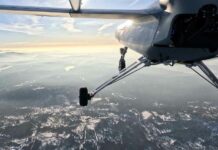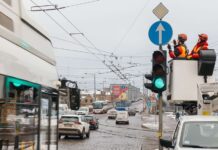David Cameron has called the President of France to discuss the crisis at the port of Calais, which he has warned he expects to last all summer.
David Cameron has called the President of France to discuss the crisis at the port of Calais, which he has warned he expects to last all summer.
After chairing a meeting of the Government’s emergency Cobra committee in Whitehall, Mr Cameron branded scenes of migrants breaking through fences and hanging onto lorries as they try to enter the Channel Tunnel “unacceptable” and declared: “We are absolutely on it. We know it needs more work.”
The Prime Minister pledged fresh measures to boost security in the French port – including extra sniffer dogs and fencing – but critics claimed they were a “sticking plaster”.
Options to relieve chronic traffic back-ups on the M20 motorway are being considered but specific locations to hold trucks unable to pass through the Tunnel are yet to be confirmed.
Laws including new powers to tackle illegal working will be fast-tracked, while Britain and France plan to put on flights to return migrants to their home countries.
Downing Street said that both the Prime Minister and President Francois Hollande expressed concern about the “immediate security challenges” at Calais and reiterated their commitment to “continue working closely together to tackle the problems posed by illegal migration”.
A Number 10 spokeswoman said on Friday: “The Prime Minister updated the President on the actions he had set in train earlier today following the meeting of Cobra and thanked the President for the work the French authorities were also undertaking.
“Both leaders agreed on the need to work with Eurotunnel to monitor and secure the area and for respective ministers to continue discussions over the coming days to implement additional measures that could further improve the situation on the ground.”
Speaking after meeting with ministers and security experts earlier in the day, Mr Cameron admitted: “This is going to be a difficult issue right across the summer.”
The ominous prediction came as police and social services struggled to cope with the impact of the events across the Channel, while businesses, lorry drivers and residents have been hit by the resulting travel chaos in Kent.
It followed a fourth night of disruption at the terminal in northern France, while migrants’ desperation to reach Britain was laid bare in an extraordinary picture showing two clinging to the top of a lorry as it arrived at Folkestone in the early hours of Friday.
There was more disruption in Calais as striking ferry workers reportedly burned tyres.
Speaking in Downing Street after the Cobra meeting, Mr Cameron said no action would be ruled out. He has assembled a team of senior ministers to lead the response.
Britain will work “hand in glove” with the French to tackle the problem, the Prime Minister said.
“The situation is not acceptable and it is absolutely this Government’s priority to deal with it in every way we can,” he said.
“We have got people trying to illegally enter our country and here in Britain we have got lorry drivers and holidaymakers facing potential delays.”
The new Immigration Bill, which includes powers to tackle illegal working and abuse of the asylum system, will be “sped up” and introduced as soon as Parliament returns, Downing Street said.
Efforts to reduce the number of migrants in Calais – estimated to be as high as 5,000 – will also be stepped up.
A No 10 spokeswoman said: “That includes stronger co-operation on returns, with UK funding and joint flights to countries like Sudan.”
Britain will provide more fencing to secure the platform at the Tunnel terminal in Coquelles in addition to equipment already promised. More border force search and dog teams will also be deployed.
The spokeswoman said “urgent options” are being pursued by defence and transport planners to create alternative parking zones to alleviate the pressure in Kent.
This may include a temporary freight overspill at Ebbsfleet, while increasing ferry capacity on different routes is also being explored.
Richard Burnett, chief executive of the Road Haulage Association, said the measures are “not enough” to tackle the “out of control” crisis.
“They are just sticking plasters in terms of trying to resolve this problem,” he told BBC News.
James Hookham, deputy chief executive of the Freight Transport Association, called for Britain to press France to make the port a “strike-free zone”.
“The wheels really came off the wagon two weeks ago because the ferry workers went on strike,” he said.
Jacques Gounon, CEO of Groupe Eurotunnel SE, has welcomed the additional security at Calais which he says adds to the reinforced security barriers and increase in security personnel that his company has put in place.
He said: “This joint and significant effort by the two governments underlines the vital importance of the Channel Tunnel Fixed Link for international co-operation.”




















